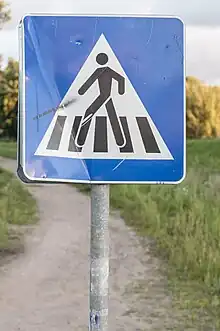
Road signs in Latvia conform to the general pattern of those used in most other European countries. They are regulated in Ceļu satiksmes noteikumi[1] and the standards documents LVS 77–1:2016 "Ceļa zīmes. 1. daļa: Ceļa zīmes", LVS 77-2:2016 "Ceļa zīmes. 2. daļa: Uzstādīšanas noteikumi" and LVS 77-3:2016 "Ceļa zīmes. 3. daļa: Tehniskās prasības" in conformity with the 1968 Vienna Convention on Road Signs and Signals.[2] Latvia acceded to the Vienna Convention on Road Signs and Signals on October 19, 1992.[3]
During the 1920s and 1930s, Latvia had developed various road signs but after Latvia was occupied and later annexed by the Soviet Union during the World War II, it used the Soviet road sign standard before adopting its own. In 1980, the standard for road signs GOST 10807-78 (ГОСТ 10807-78) was adopted in the Soviet Union before its dissolution in 1991.[4] After the restoration of the independence of Latvia in 1990, it became necessary to create its own standard for road signs in Latvia. Unlike most post-Soviet states, modern road signs in Latvia look different from those used in neighbouring Russia, Ukraine, Belarus, Lithuania. Latvian road signs use the DIN 1451 typeface.[5]
The text used on signs is in the state language, Latvian. Recently, some signs have been introduced with Latvian supplemented by Livonian and Latgalian. In November 2021, the first standard-compliant road sign with Latgalian was placed on the border of Balvi Municipality, with others being gradually installed in other locations in Latgale.[6] In January 2023, the first of 171 approved signs with Livonian text were placed on the border of Talsi Municipality, with others expected to be placed in villages along the Livonian Coast.[7][8]
Warning signs
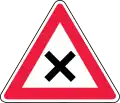 Crossroads without priority (give way to the vehicles coming from the right)
Crossroads without priority (give way to the vehicles coming from the right)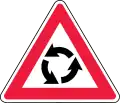 Roundabout
Roundabout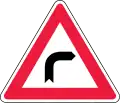 Dangerous curve to the right
Dangerous curve to the right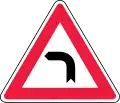 Dangerous curve to the left
Dangerous curve to the left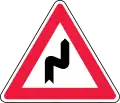 Double curve, first to the right
Double curve, first to the right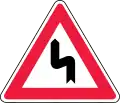 Double curve, first to the left
Double curve, first to the left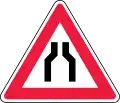 Road narrows on both sides
Road narrows on both sides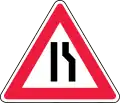 Road narrows on right side
Road narrows on right side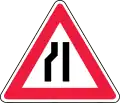 Road narrows on left side
Road narrows on left side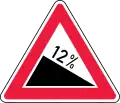 Steep descent
Steep descent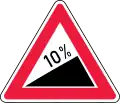 Steep ascent
Steep ascent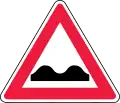 Uneven road
Uneven road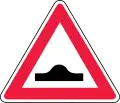 Speed bumps
Speed bumps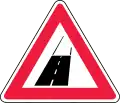 Changing the road surface
Changing the road surface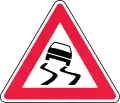 Slippery road
Slippery road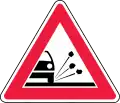 Loose chippings
Loose chippings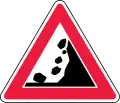 Falling stones
Falling stones Roadworks ahead
Roadworks ahead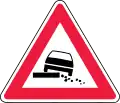 Dangerous shoulder
Dangerous shoulder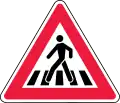 Pedestrian crossing
Pedestrian crossing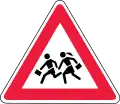 Children
Children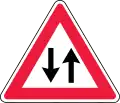 Two-way traffic
Two-way traffic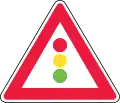 Traffic signals ahead
Traffic signals ahead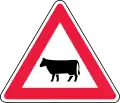 Animals e.g for cattle
Animals e.g for cattle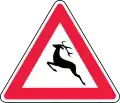 Animals e.g for deer
Animals e.g for deer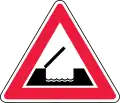 Swing bridge
Swing bridge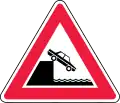 Unproteceted quayside or riverbank ahead
Unproteceted quayside or riverbank ahead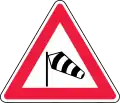 Sidewinds
Sidewinds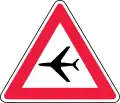 Low-flying aircraft
Low-flying aircraft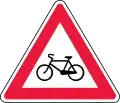 Cyclists
Cyclists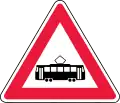 Tram Crossing
Tram Crossing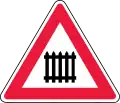 Level crossing ahead, with gates
Level crossing ahead, with gates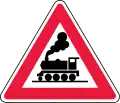 Level crossing ahead, without gates
Level crossing ahead, without gates Level crossing (single track)
Level crossing (single track)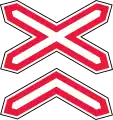 Level crossing (multiple tracks)
Level crossing (multiple tracks) Level crossing countdown
Level crossing countdown Level crossing countdown
Level crossing countdown Level crossing countdown
Level crossing countdown Level crossing countdown
Level crossing countdown Level crossing countdown
Level crossing countdown Level crossing countdown
Level crossing countdown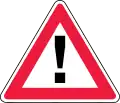 Other dangers
Other dangers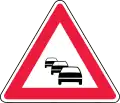 Traffic jams
Traffic jams
Priority signs
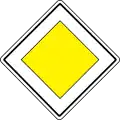 Priority road
Priority road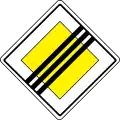 End of priority road
End of priority road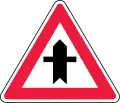 Junction with minor road
Junction with minor road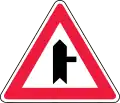 Junction with minor road (from the right)
Junction with minor road (from the right)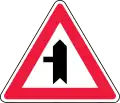 Junction with minor road (from the left)
Junction with minor road (from the left)

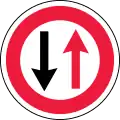 Give priority to oncoming traffic
Give priority to oncoming traffic Priority over oncoming traffic
Priority over oncoming traffic
Prohibitory signs
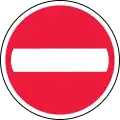 No entry
No entry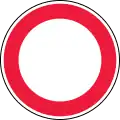 Closed to all vehicles in both directions
Closed to all vehicles in both directions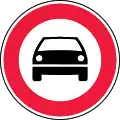 No motor vehicles except motorcycles
No motor vehicles except motorcycles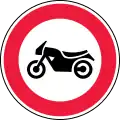 No motorcycles
No motorcycles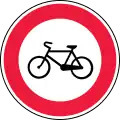 No cycles
No cycles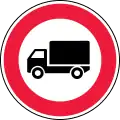 No trucks
No trucks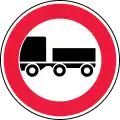 No trailers
No trailers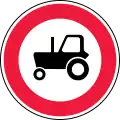 No tractors
No tractors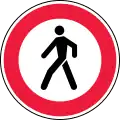 No pedestrians
No pedestrians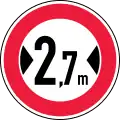 Width limit
Width limit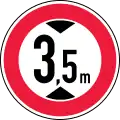 Height limit
Height limit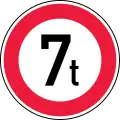 Mass limit
Mass limit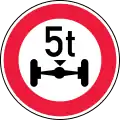 Total mass limit
Total mass limit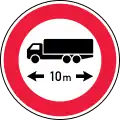 Length limit
Length limit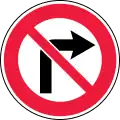 No right turn
No right turn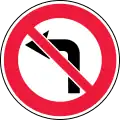 No left turn
No left turn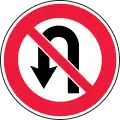 No U-turn
No U-turn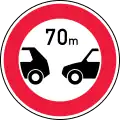 Minimum separation
Minimum separation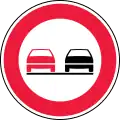 No overtaking
No overtaking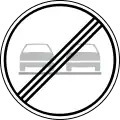 End of overtaking prohibition
End of overtaking prohibition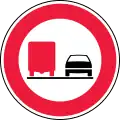 No overtaking by trucks
No overtaking by trucks End of overtaking prohibition by trucks
End of overtaking prohibition by trucks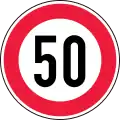 Maximum speed limit
Maximum speed limit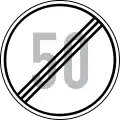 End of maximum speed limit
End of maximum speed limit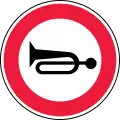 No audible warning devices
No audible warning devices No stopping or standing
No stopping or standing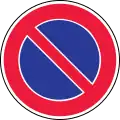 No parking or waiting
No parking or waiting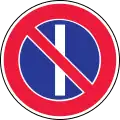 Alternate parking on odd days
Alternate parking on odd days Alternate parking on even days
Alternate parking on even days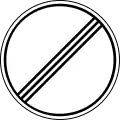 End of all prohibitions
End of all prohibitions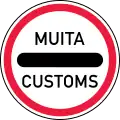 Customs
Customs Police
Police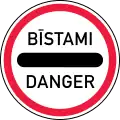 Driving further is dangerous
Driving further is dangerous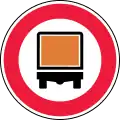 No vehicles carrying dangerous goods
No vehicles carrying dangerous goods
Mandatory signs
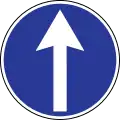 Ahead only
Ahead only Turn right
Turn right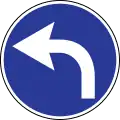 Turn left
Turn left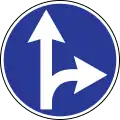 Straight ahead or right turn permitted
Straight ahead or right turn permitted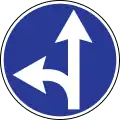 Straight ahead or left turn permitted
Straight ahead or left turn permitted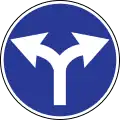 Turn left or right
Turn left or right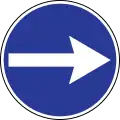 Turn right
Turn right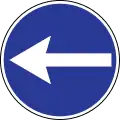 Turn left
Turn left Roundabout ahead
Roundabout ahead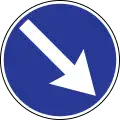 Pass side from right
Pass side from right Pass side from left
Pass side from left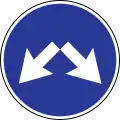 Pass either side
Pass either side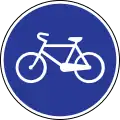 Cycle path
Cycle path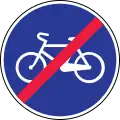 End of cycle path
End of cycle path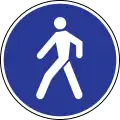 Pedestrian path
Pedestrian path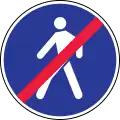 End of pedestrian path
End of pedestrian path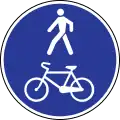 Cycle and pedestrian path
Cycle and pedestrian path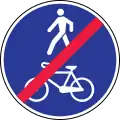 End of cycle and pedestrian path
End of cycle and pedestrian path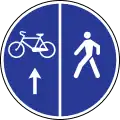 Segregated cycle and pedestrian path
Segregated cycle and pedestrian path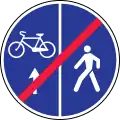 End of segregated cycle and pedestrian path
End of segregated cycle and pedestrian path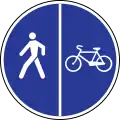 Cycle and pedestrian path
Cycle and pedestrian path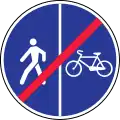 End of segregated cycle and pedestrian path
End of segregated cycle and pedestrian path.svg.png.webp) Minimum speed
Minimum speed.svg.png.webp) End of minimum speed
End of minimum speed Proceed straight for vehicles carrying dangerous goods
Proceed straight for vehicles carrying dangerous goods Proceed right for vehicles carrying dangerous goods
Proceed right for vehicles carrying dangerous goods Proceed left for vehicles carrying dangerous goods
Proceed left for vehicles carrying dangerous goods
Special regulation signs
 One-way street
One-way street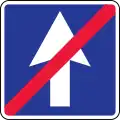 End of one-way street
End of one-way street One-way street to the right
One-way street to the right One-way street to the left
One-way street to the left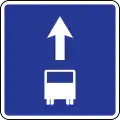 Bus lane
Bus lane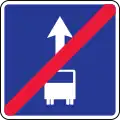 End of bus lane
End of bus lane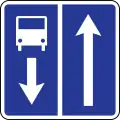 A road with a contraflow bus lane
A road with a contraflow bus lane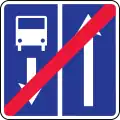 End of the road with a contraflow bus lane
End of the road with a contraflow bus lane Exit to the road with a contraflow bus lane to the left
Exit to the road with a contraflow bus lane to the left Exit to the road with a contraflow bus lane to the right
Exit to the road with a contraflow bus lane to the right Minimum driving speed limit in lanes
Minimum driving speed limit in lanes Maximum driving speed limit in lanes
Maximum driving speed limit in lanes Driving directions in lanes
Driving directions in lanes Driving direction in the lane (proceed straight)
Driving direction in the lane (proceed straight)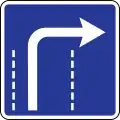 Driving direction in the lane (turn right)
Driving direction in the lane (turn right) Driving direction in the lane (turn left)
Driving direction in the lane (turn left) Driving direction in the lane (proceed straight or turn right)
Driving direction in the lane (proceed straight or turn right) Driving direction in the lane (proceed straight or keep left)
Driving direction in the lane (proceed straight or keep left) Settlement
Settlement End of settlement
End of settlement Settlement
Settlement End of settlement
End of settlement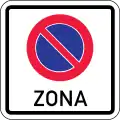 No parking area
No parking area.svg.png.webp) Customs area
Customs area.svg.png.webp) End of no parking area
End of no parking area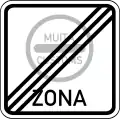 End of customs area
End of customs area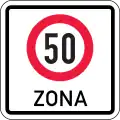 Speed limit zone
Speed limit zone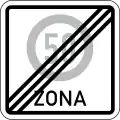 End of speed limit zone
End of speed limit zone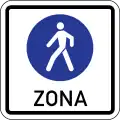 Pedestrian zone
Pedestrian zone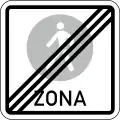 End of pedestrian zone
End of pedestrian zone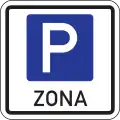 Parking zone
Parking zone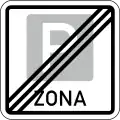 End of parking zone
End of parking zone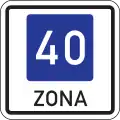 Recommended speed zone
Recommended speed zone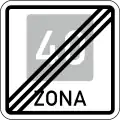 End of recommended speed zone
End of recommended speed zone Home zone
Home zone End of home zone
End of home zone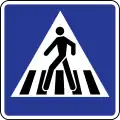 Pedestrian crossing
Pedestrian crossing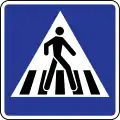 Pedestrian crossing
Pedestrian crossing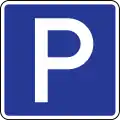 Parking
Parking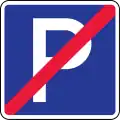 End of Parking
End of Parking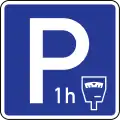 Paid parking
Paid parking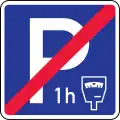 End of paid parking
End of paid parking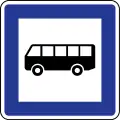 Bus stop
Bus stop.svg.png.webp) Tram stop
Tram stop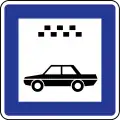 Taxi stop
Taxi stop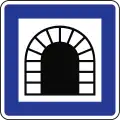 Tunnel
Tunnel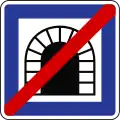 Tunnel stop
Tunnel stop
 Border area
Border area End of border area
End of border area Borderland
Borderland End of borderland
End of borderland Border control point
Border control point Road for motor vehicles
Road for motor vehicles End of road for motor vehicles
End of road for motor vehicles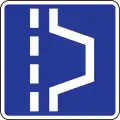 Forced stop
Forced stop Locality
Locality End of locality
End of locality
Service signs
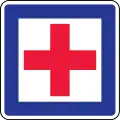 Medical aid point
Medical aid point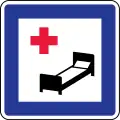 Hospital
Hospital Gas station
Gas station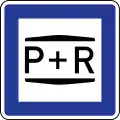 Park and Ride facilities
Park and Ride facilities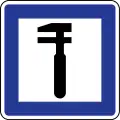 Maintenance point
Maintenance point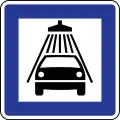 Car wash
Car wash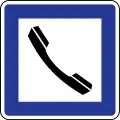 Telephone
Telephone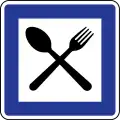 Restaurant
Restaurant Cafe
Cafe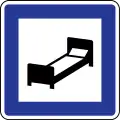 Hotel, motel or guest house
Hotel, motel or guest house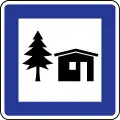 Youth tourism center
Youth tourism center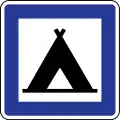 Camping
Camping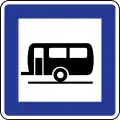 Caravan parking
Caravan parking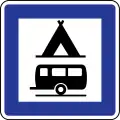 Camping and caravan parking
Camping and caravan parking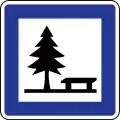 Resting place
Resting place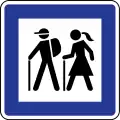 Pedestrian route
Pedestrian route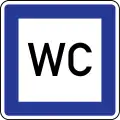 Toilet
Toilet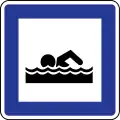 Swimming pool
Swimming pool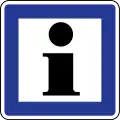 Tourist information
Tourist information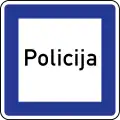 Police
Police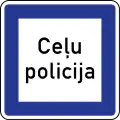 Traffic police
Traffic police Mail
Mail Radio channel for providing road traffic information
Radio channel for providing road traffic information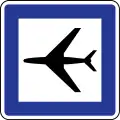 Airport (airfield)
Airport (airfield)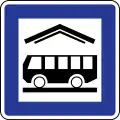 Bus station
Bus station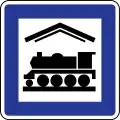 Railway station
Railway station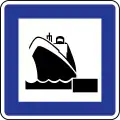 Sea passenger station
Sea passenger station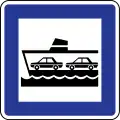 Ferry
Ferry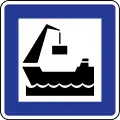 Cargo port
Cargo port Information block
Information block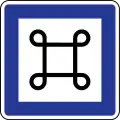 A remarkable place
A remarkable place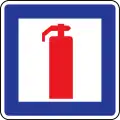 Fire extinguisher
Fire extinguisher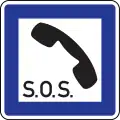 Emergency phone
Emergency phone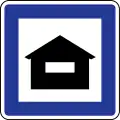 Rural tourism seat
Rural tourism seat
Direction signs
 Preliminary direction indicator
Preliminary direction indicator Preliminary direction indicator
Preliminary direction indicator Preliminary direction indicator
Preliminary direction indicator Preliminary direction indicator
Preliminary direction indicator Preliminary direction indicator
Preliminary direction indicator Direction indicator
Direction indicator Direction indicator
Direction indicator Direction indicator
Direction indicator Direction indicator
Direction indicator Direction indicator
Direction indicator Direction indicator
Direction indicator Distance indicator
Distance indicator Distance indicator
Distance indicator River name
River name Driving scheme
Driving scheme Obstacle bypass direction
Obstacle bypass direction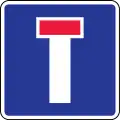
 Dead end on the right
Dead end on the right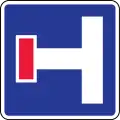 Dead end on the left
Dead end on the left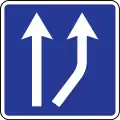 Start of lane on the right
Start of lane on the right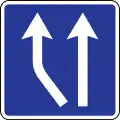 Start of lane on the left
Start of lane on the left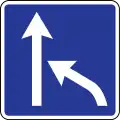 End of lane on the right
End of lane on the right End of land on the left
End of land on the left Driving directions in lanes (no trucks allowed in one lane)
Driving directions in lanes (no trucks allowed in one lane) Driving directions in lanes
Driving directions in lanes Driving directions in lanes
Driving directions in lanes Lane adherence to base lanes
Lane adherence to base lanes Lane adherence to base lanes
Lane adherence to base lanes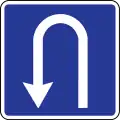 U-turn permitted
U-turn permitted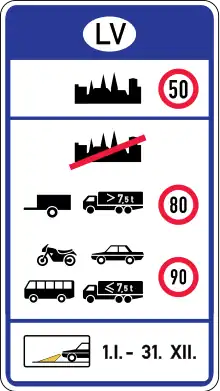 Traffic restrictions in Latvia
Traffic restrictions in Latvia Recommended speed
Recommended speed Driving direction of trucks (proceed straight)
Driving direction of trucks (proceed straight) Driving direction of trucks (turn right)
Driving direction of trucks (turn right) Driving direction of trucks (turn left)
Driving direction of trucks (turn left) Pedestrian underpass or overpass
Pedestrian underpass or overpass Scheme of bypass road
Scheme of bypass road Direction of bypass road (proceed straight)
Direction of bypass road (proceed straight) Direction of bypass road (turn right)
Direction of bypass road (turn right) Direction of bypass road (turn left)
Direction of bypass road (turn left) End of detour
End of detour Pointer to reorder
Pointer to reorder Pointer to reorder
Pointer to reorder Pointer to reorder
Pointer to reorder Pointer to reorder
Pointer to reorder Pointer to reorder
Pointer to reorder Kilometer indicator
Kilometer indicator.svg.png.webp) European route number
European route number.svg.png.webp) Motorway number
Motorway number.svg.png.webp) Regional road number
Regional road number European route number and direction
European route number and direction Motorway number and direction
Motorway number and direction Regional road number and direction
Regional road number and direction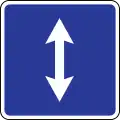 Road with reverse traffic
Road with reverse traffic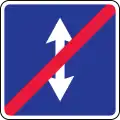 End of road with reverse traffic
End of road with reverse traffic Departure on a road with reverse traffic
Departure on a road with reverse traffic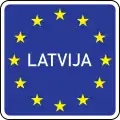 EU country border
EU country border Name of the administrative territory
Name of the administrative territory
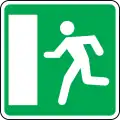 Emergency exit
Emergency exit Emergency exit direction
Emergency exit direction
Additional signs
 Distance
Distance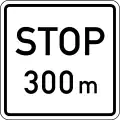 Stop ahead
Stop ahead Length
Length Coverage area
Coverage area Coverage area
Coverage area Coverage area
Coverage area Coverage area
Coverage area Coverage area
Coverage area Coverage area
Coverage area Coverage area
Coverage area Coverage area
Coverage area Coverage area
Coverage area Coverage area
Coverage area Directions of action
Directions of action Directions of action
Directions of action Directions of action
Directions of action Driving lane
Driving lane Type of vehicle (truck)
Type of vehicle (truck) Type of vehicle (truck with lane)
Type of vehicle (truck with lane) Type of vehicle (car)
Type of vehicle (car) Type of vehicle (bus)
Type of vehicle (bus) Type of vehicle (tractor)
Type of vehicle (tractor) Type of vehicle (motorcycle)
Type of vehicle (motorcycle) Type of vehicle (bike)
Type of vehicle (bike) Working days
Working days Weekends and holidays
Weekends and holidays Validity period
Validity period Validity period in working days
Validity period in working days Validity period in weekends and holidays
Validity period in weekends and holidays Type of vehicle parking
Type of vehicle parking Type of vehicle parking
Type of vehicle parking Type of vehicle parking
Type of vehicle parking Type of vehicle parking
Type of vehicle parking Type of vehicle parking
Type of vehicle parking Type of vehicle parking
Type of vehicle parking Type of vehicle parking
Type of vehicle parking Type of vehicle parking
Type of vehicle parking Type of vehicle parking
Type of vehicle parking Type of vehicle parking
Type of vehicle parking Parking time
Parking time Automobile viewing area
Automobile viewing area Limitation of the permitted maximum mass
Limitation of the permitted maximum mass Blind pedestrians
Blind pedestrians Disabled people
Disabled people Wet cover
Wet cover Slippery cover
Slippery cover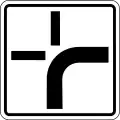 Direction of the main road
Direction of the main road A tow truck is working
A tow truck is working Other additional information
Other additional information Speed bump
Speed bump Paid parking time
Paid parking time Turn off the engine
Turn off the engine Photo radar
Photo radar Information about the bicycle path
Information about the bicycle path Information about the bicycle path
Information about the bicycle path Information about the bicycle path
Information about the bicycle path Bicycle route
Bicycle route European Union cycle route
European Union cycle route Supply of goods
Supply of goods Electric cars
Electric cars
References
- ↑ "Ceļu satiksmes noteikumi". Likumi.lv (in Latvian). 2015-06-02. Retrieved 2022-12-30.
- ↑ "Ceļa zīmes no bērza saplākšņa" (PDF). Troja.lv.
- ↑ "United Nations Treaty Collection". treaties.un.org. Retrieved 2023-12-09.
- ↑ Lazdiņš, Viesturs (1982). Autopārvadājumi (PDF) (in Latvian). p. 52.
- ↑ "Vertikālo ceļa zīmju piegādes tehniskie noteikumi TL-VZ 2004". europa.eu (in Latvian).
- ↑ "Balvu novadā ceļazīmes arī latgaliešu rakstu valodā" [Balvi Municipality gets road signs with written Latgalian]. Lsm.lv (in Latvian). 2021-11-24. Retrieved 2023-07-19.
- ↑ "Re:voice - The First Livonian Language Road Sign Unveiled in Latvia". revoice.falmouth.ac.uk. Retrieved 2023-07-19.
- ↑ Ozola-Balode, Zanda (2023-01-27). "Talsu novada nosaukums tagad arī lībiešu valodā; šādi uzraksti būs vismaz 14 piekrastes ciemos" [The sign of the name of Talsi Municipality now also in Livonian; similar signs will be placed in 44 Livonian Coast villages]. Lsm.lv (in Latvian). Retrieved 2023-07-19.